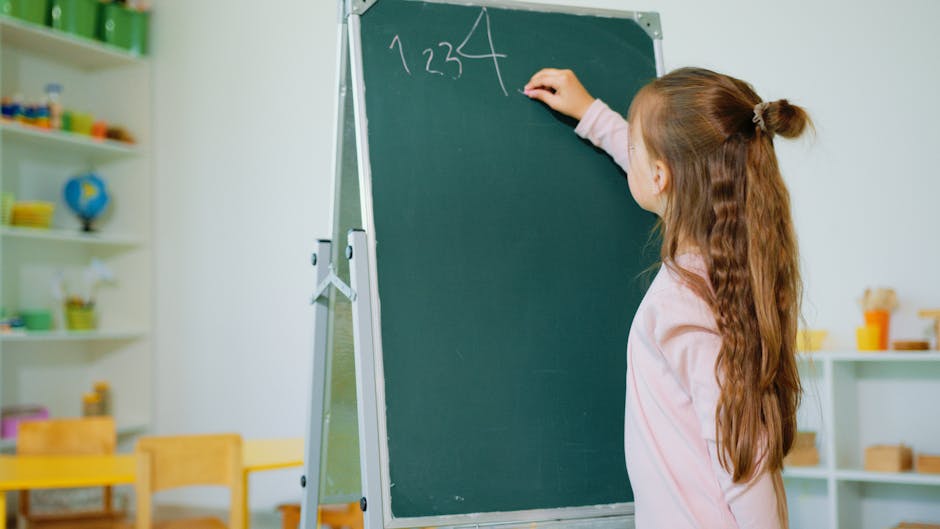
· By Jen Jones
Core Skills for Early Learners: Understanding Foundational Literacy and Numeracy
Introduction
What is foundational literacy and numeracy? Foundational literacy and numeracy refer to the basic skills that form the backbone of a child's education. They include:
- Literacy: Reading, writing, and comprehension skills.
- Numeracy: Basic math skills, such as counting, addition, and subtraction.
Understanding these skills early on is crucial as they prepare children for future learning and everyday life. Let's dive into why foundational literacy and numeracy are so important.
When children develop these skills at an early age, they lay the groundwork for lifelong learning and success. Imagine a child learning to read their first storybook or solve a simple math problem. These small steps build confidence and open doors to new knowledge.
Research shows that mastering literacy and numeracy early helps children in many ways:
- Improved Academic Performance: Strong literacy and numeracy skills help kids excel in other subjects.
- Better Job Opportunities: Many careers require solid reading and math skills.
- Enhanced Critical Thinking: These skills are essential for solving problems and making informed decisions.
In fact, studies highlight that children who succeed in these areas early on are more likely to stay in school longer and achieve greater success in adulthood.

What is Foundational Literacy and Numeracy?
Foundational Literacy and Numeracy (FLN) are the basic skills in reading, writing, and arithmetic that children must develop early in life. These skills are the building blocks for all future learning and personal development. Without them, children struggle to succeed academically and in their future careers.
Key Components of Foundational Literacy
Foundational literacy includes several critical elements that help children become proficient readers and writers:
-
Phonemic Awareness: This is the ability to hear, identify, and manipulate individual sounds (phonemes) in spoken words. It helps children understand that words are made up of smaller sounds, which is essential for reading and spelling.
-
Decoding: This involves associating letters with their corresponding sounds. When children learn to decode, they can read new words by sounding them out.
-
Reading Fluency: Fluency is the ability to read smoothly with speed, accuracy, and proper expression. Fluent readers can focus on understanding the text rather than just decoding words.
-
Comprehension: This is the ability to understand the text’s message, main points, and details. Reading comprehension is crucial for learning from texts and enjoying reading.
-
Writing: Writing includes several skills:
- Handwriting: Learning the motor skills to write letters and words.
- Spelling: Memorizing standard spelling for words.
- Grammar: Understanding sentence structure, punctuation, and parts of speech.
- Expression: Developing the ability to articulate thoughts, arguments, and emotions in written form.
Key Components of Foundational Numeracy
Foundational numeracy covers the basic mathematical skills that children need to understand and use numbers in daily life:
-
Pre-number Concepts: These include understanding ideas like more, less, same, different, and patterns. These concepts are the foundation for learning numbers.
-
Numbers and Operations: This includes recognizing numbers, counting, and performing basic operations like addition, subtraction, multiplication, and division.
-
Shapes and Spatial Understanding: Recognizing different shapes and understanding their properties. Spatial understanding helps children grasp concepts like size, position, direction, and movement.
-
Measurement: Understanding different units of measurement like length, weight, and time. Children also learn how to compare and convert between different units.
-
Data Handling: This includes reading and interpreting graphs and charts. Children also learn basic statistical concepts like mean, median, and mode.

By mastering these components, children build a strong foundation in literacy and numeracy. This foundation enables them to learn more complex skills and concepts as they grow older.
Challenges in Implementing Foundational Literacy and Numeracy
Teacher Training
A challenge in implementing foundational literacy and numeracy is ensuring that teachers are well-trained. Many teachers lack specialized training in teaching these fundamental skills. According to the National Policy on Education (NEP, 2020), about 50 million children in India have not attained foundational literacy and numeracy, partly due to insufficient teacher training.
Training programs need to focus on effective teaching methods for literacy and numeracy. This includes phonemic awareness, decoding, and reading fluency for literacy, as well as pre-number concepts, operations, and data handling for numeracy. Without proper training, teachers may struggle to provide the high-quality instruction that students need.
Resource Allocation
Another major challenge is the lack of resources. Many schools, especially in low-income areas, don't have enough textbooks, teaching aids, or even qualified teachers. This shortage makes it difficult to teach foundational skills effectively.
For instance, a report by UNICEF highlights that, on average, 40% of children across OECD and EU countries do not have basic reading and mathematics skills by age 15. This statistic underscores the need for better resource allocation to ensure all students have access to quality education.
Parental Involvement
Parental involvement is crucial for the success of foundational literacy and numeracy programs. However, many parents may not have the time, resources, or educational background to support their children's learning at home.
Simple activities like reading to children daily or playing counting games can make a big difference. Encouraging parents to model reading and numeracy skills at home can also be beneficial. For example, making signs for household items or involving children in cooking and measuring activities can help reinforce these skills.
Multilingual Settings
In multilingual settings, teaching foundational literacy and numeracy becomes even more complex. Children may speak one language at home but are taught in another at school. This language barrier can make it difficult for them to grasp basic reading and math skills.
Programs need to be designed with multilingualism in mind. Teachers should be trained to handle diverse linguistic backgrounds and use teaching methods that can bridge language gaps. For instance, using visual aids and interactive activities can help children understand concepts better, regardless of the language used.
Addressing these challenges requires a multifaceted approach. By improving teacher training, allocating more resources, involving parents, and considering multilingual settings, we can better support the development of foundational literacy and numeracy skills in young learners.
Strategies for Effective Teaching of Foundational Literacy and Numeracy
Curriculum Design
A well-thought-out curriculum is key to building strong foundational literacy and numeracy skills. Sequential learning is crucial—start with the basics and gradually introduce more complex concepts. For example, children should first learn to recognize letters before they tackle reading sentences. Similarly, understanding numbers comes before learning addition and subtraction.
Interactive Methods
Interactive teaching methods make learning fun and engaging. Use manipulatives like blocks and flashcards to help children visualize math concepts. Real-world examples can also make lessons more relatable. For instance, counting fruits during snack time can reinforce number recognition and arithmetic skills.
Technology Use
Technology can be a powerful tool in education. Educational apps and blended learning methods combine traditional teaching with digital tools. Apps like Hello Decodables offer interactive lessons that adapt to each child's learning pace. Blended learning can include online quizzes and games that make learning more engaging.
Community Programs
Community involvement is essential for reinforcing what children learn in school. Adult literacy centers can help parents improve their own skills, enabling them to support their children's education better. Peer-to-peer learning programs, where older students mentor younger ones, can also be highly effective.
Educational Apps
Educational apps are designed to make learning interactive and fun. Apps can provide personalized lessons that adapt to a child's progress. They can also offer instant feedback, helping children correct mistakes and learn more effectively.
Blended Learning
Blended learning combines traditional classroom methods with digital tools. This approach allows for more flexible and personalized learning experiences. For example, students can watch educational videos at home and then practice what they've learned in class.
Adult Literacy Centers
Adult literacy centers offer courses for adults who missed out on basic education. These centers help parents improve their literacy and numeracy skills, enabling them to better support their children's learning at home.
Peer-to-Peer Learning
Peer-to-peer learning involves older students mentoring younger ones. This approach not only helps younger students grasp fundamental concepts but also reinforces the older students' knowledge. It's a win-win situation that fosters a collaborative learning environment.
Next, let’s explore the Benefits of Strong Foundational Literacy and Numeracy Skills and how they impact personal development, economic opportunities, and social inclusion.
Benefits of Strong Foundational Literacy and Numeracy Skills
Economic and Social Impacts
Strong foundational literacy and numeracy skills are crucial for personal development, economic opportunities, and social inclusion. Let's break down these benefits:
Personal Development
Literacy and numeracy are the building blocks for higher-order thinking skills. They enable individuals to perform everyday tasks independently, boosting self-reliance. "Literacy empowers individuals to access and understand information," states a Quora article. This empowerment leads to better decision-making in various aspects of life, from understanding medical prescriptions to managing personal finances.
Economic Impact
Foundational skills significantly impact job opportunities and upward mobility. Many jobs require basic literacy and numeracy skills. According to Cosmus Gatuyu, "These foundational skills open the door for specialized training and higher education." This means more job opportunities and the potential for career advancement. Additionally, higher literacy and numeracy rates can lead to improved GDP and economic growth.
Social Inclusion
Literacy and numeracy are essential for social interactions and self-esteem. Being literate helps individuals participate in community activities and civic duties, such as voting and understanding societal issues. The Quora article highlights that "A strong foundation in literacy and numeracy levels the playing field," ensuring equal opportunities for all, regardless of socio-economic background.
Job Opportunities
Basic literacy and numeracy skills are often prerequisites for many jobs. Being literate enhances employability and opens up more opportunities for career advancement. "Strong numeracy skills can lead to better job opportunities and career advancement," notes the Quora article. This is crucial in today's competitive job market.
Civic Participation
Literacy is crucial for understanding societal issues, making informed decisions, and participating in community activities. "Literacy is crucial for understanding societal issues, voting, and community involvement," states Cosmus Gatuyu. This means that literate individuals are more likely to be active and informed citizens.
Critical Thinking
Literacy and numeracy promote critical thinking skills. They enable individuals to analyze information, evaluate arguments, and make reasoned judgments. According to the Quora article, "Literacy promotes critical thinking skills, allowing individuals to analyze information, evaluate arguments, and make reasoned judgments." This is essential for personal and professional growth.
Strong foundational literacy and numeracy skills are the bedrock of personal and societal development. They empower individuals, enhance economic opportunities, and foster social inclusion.
Next, we'll delve into The Role of Policy and Global Goals and how initiatives like NEP 2020 and the NIPUN Bharat Mission aim to strengthen these foundational skills.
The Role of Policy and Global Goals
National and International Frameworks
National Education Policy (NEP) 2020 is a transformative framework aimed at overhauling India's education system. It emphasizes the importance of foundational literacy and numeracy (FLN) and sets the ambitious goal of achieving universal FLN in primary schools by 2025. This policy proposes a new pedagogical structure of 5+3+3+4, where the first five years focus on foundational learning, including three years of preschool and Grades I and II.
To support NEP 2020's goals, the National Initiative for Proficiency in Reading with Understanding and Numeracy (NIPUN) Bharat Mission was launched. This mission aims to ensure that every child in the foundational stage attains the desired learning outcomes by 2026-27. NIPUN Bharat is focused on several key areas:
- Teacher Capacity Building: Training teachers through programs like NISHTHA FLN.
- High-Quality Learning Materials: Developing resources such as the National Curricular Framework for Foundational Stage (NCF-FS).
- Progress Tracking: Monitoring each child's progress to ensure effective learning.
One standout initiative under NIPUN Bharat is Jaadui Pitara, launched on 20th February 2023. It includes engaging teaching and learning materials like toys, games, puzzles, and story cards designed to make learning fun and effective.
On the international front, the Sustainable Development Goals (SDGs), particularly Goal 4, aim to ensure inclusive and equitable quality education and promote lifelong learning opportunities for all. This aligns with NEP 2020 and NIPUN Bharat's objectives, creating a cohesive global effort toward educational excellence.
India's G20 Education Working Group (EdWG) Presidency has also prioritized FLN, especially in the context of blended learning. Discussions have focused on various themes such as multilingualism, teacher capacity building, and digital interventions to enhance FLN outcomes.
These national and international frameworks collectively aim to create a robust foundation for early learners, ensuring they acquire essential literacy and numeracy skills that will benefit them throughout their lives.
Conclusion
As we look to the future, the importance of foundational literacy and numeracy cannot be overstated. These core skills are the bedrock upon which all other learning is built. They equip children with the ability to read, write, and understand numbers, setting them up for success in both their personal and professional lives.
Future Outlook
The global focus on improving foundational literacy and numeracy is growing. With initiatives like NEP 2020 and the NIPUN Bharat Mission, countries are making concerted efforts to ensure that every child gains these essential skills. The G20 Education Working Group's emphasis on themes such as multilingualism and teacher capacity building further highlights the importance of these skills on an international stage.
However, there is still much work to be done. Research indicates that while foundational skills are crucial, they must be part of a broader educational strategy that includes safety, health, and higher-order thinking skills. Policymakers and educators must continue to invest in these areas, ensuring that foundational literacy and numeracy are not pursued at the expense of other critical educational needs.
Hello Decodables
At Hello Decodables, we are committed to supporting this mission. Our decodable books are designed to make learning to read a joyful and successful experience for early learners. By providing structured, engaging content, we help children build the strong literacy skills they need for lifelong learning.
We believe in the power of foundational literacy and numeracy to transform lives. Our resources are crafted to align with the latest educational research and best practices, ensuring that every child has the opportunity to achieve their full potential.
If you're interested in learning more about how our decodable books can support your child's literacy journey, visit our guide to decodable books.
Together, we can build a future where every child is empowered with the foundational skills they need to thrive.
